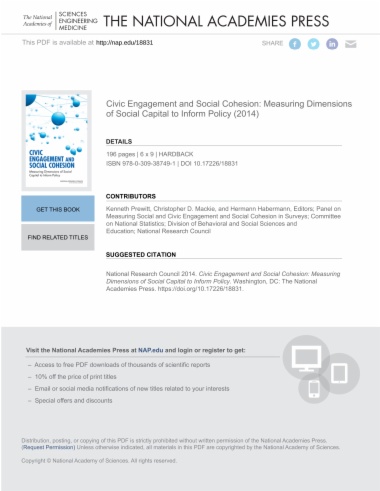

People's bonds, associations and networks - as well as the civil, political, and institutional characteristics of the society in which they live - can be powerful drivers affecting the quality of life among a community's, a city's, or a nation's inhabitants and their ability to achieve both individual and societal goals. Civic engagement, social cohesion, and other dimensions of social capital affect social, economic and health outcomes for individuals and communities. Can these be measured, and can federal surveys contribute toward this end? Can this information be collected elsewhere, and if so, how should it be collected?
Civic Engagement and Social Cohesion identifies measurement approaches that can lead to improved understanding of civic engagement, social cohesion, and social capital - and their potential role in explaining the functioning of society. With the needs of data users in mind, this report examines conceptual frameworks developed in the literature to determine promising measures and measurement methods for informing public policy discourse. The report identifies working definitions of key terms; advises on the feasibility and specifications of indicators relevant to analyses of social, economic, and health domains; and assesses the strength of the evidence regarding the relationship between these indicators and observed trends in crime, employment, and resilience to shocks such as natural disasters. Civic Engagement and Social Cohesion weighs the relative merits of surveys, administrative records, and non-government data sources, and considers the appropriate role of the federal statistical system. This report makes recommendations to improve the measurement of civic health through population surveys conducted by the government and identifies priority areas for research, development, and implementation.